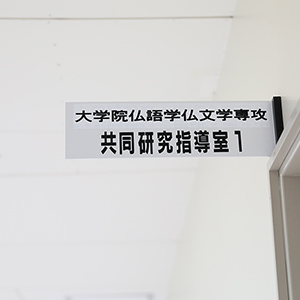Features of French Language and Literature Major
In this major, in order for graduate students to acquire the universality of French culture, the French language aspect focuses on modern French, and the French literature aspect focuses on the 16th, 18th, 19th and 20th centuries. The curriculum of this major has been composed by full-time faculty staff members that specialize in each of these areas, and detailed research guidance and education are provided to cater to the needs of each graduate student.
Curriculum
Master's Program
Please click on the tab of the field you want to view.
- French Language
- French Literature
| Subjects | Number of Credits |
|---|---|
| Specialized Lecture in French Language I a | 2 credits |
| Specialized Lecture in French Language I b | 2 credits |
| Graduate Seminar in French Language I | 4 or 8 credits |
| Specialized Lecture in French Language II a | 2 credits |
| Specialized Lecture in French Language II b | 2 credits |
| Graduate Seminar in French Language II | 4 or 8 credits |
| Specialized Lecture in French Language III a | 2 credits |
| Specialized Lecture in French Language III b | 2 credits |
| Graduate Seminar in French Language III | 4 or 8 credits |
| Specialized Lecture in French Language IVa | 2 credits |
| Specialized Lecture in French Language IVb | 2 credits |
| Graduate Seminar in French Language IV | 4 or 8 credits |
| Intensive Course in French Language I | 2 credits |
| Intensive Course in French Language II b | 2 credits |
| Subjects | Number of Credits |
|---|---|
| Specialized Lecture in French Literature I a | 2 credits |
| Specialized Lecture in French Literature I b | 2 credits |
| Graduate Seminar in French Literature I | 4 or 8 credits |
| Specialized Lecture in French Literature II a | 2 credits |
| Specialized Lecture in French Literature II b | 2 credits |
| Graduate Seminar in French Literature II | 4 or 8 credits |
| Specialized Lecture in French Literature III a | 2 credits |
| Specialized Lecture in French Literature III b | 2 credits |
| Graduate Seminar in French Literature III | 4 or 8 credits |
| Specialized Lecture in French Literature IV a | 2 credits |
| Specialized Lecture in French Literature IV b | 2 credits |
| Graduate Seminar in French Literature IV | 4 or 8 credits |
| Specialized Lecture in French Literature Ⅴ a | 2 credits |
| Specialized Lecture in French Literature Ⅴ b | 2 credits |
| Graduate Seminar in French Literature Ⅴ | 4 or 8 credits |
| Specialized Lecture in French Literature VI a | 2 credits |
| Specialized Lecture in French Literature VI b | 2 credits |
| Graduate Seminar in French Literature VI | 4 or 8 credits |
| Intensive Course in French Literature I | 2 credits |
| Intensive Course in French Literature II | 2 credits |
| Specialized Lecture in European Studies II a | 2 credits |
| Specialized Lecture in European Studies II b | 2 credits |
| Graduate Seminar in European Studies II | 4 or 8 credits |
Doctoral Program
Please click on the tab of the field you want to view.
- French Language
- Modern French Literature
- Contemporary French Literature
| Tutorial Academic Subjects | Number of Credits |
|---|---|
| Special Studies in French Language I | 4 or 12 credits |
| Special Studies in French Language II | 4 or 12 credits |
| Special Lecture in French Language I | 4 credits |
| Special Lecture in French Language II | 4 credits |
| Tutorial Academic Subjects | Number of Credits |
|---|---|
| Special Studies in French Literature I | 4 or 12 credits |
| Special Studies in French Literature II | 4 or 12 credits |
| Special Studies in French Literature III | 4 or 12 credits |
| Special Lecture in French Literature I | 4 credits |
| Special Lecture in French Literature II | 4 credits |
| Special Lecture in French Literature III | 4 credits |
| Tutorial Academic Subjects | Number of Credits |
|---|---|
| Special Studies in French Literature IV | 4 or 12 credits |
| Special Studies in French Literature Ⅴ | 4 or 12 credits |
| Special Studies in French Literature VI | 4 or 12 credits |
| Special Lecture in French Literature IV | 4 credits |
| Special Lecture in French Literature Ⅴ | 4 credits |
| Special Lecture in French Literature VI | 4 credits |
Process of Acquiring a Master’s Degree or PhD
Master's Program
Requirements for Applying for a Master’s Degree
- Period of Enrollment
You must be enrolled in the master's program for more than 2 years. - Credit Requirements
A total of 32 credits or more must be obtained for a predetermined subject.
Process to Apply for a Degree
-
Framework of Research Guidance
Students will receive guidance on setting a research theme and creating a research plan in their field of specialization from a supervisor determined at the time of enrollment. Graduate students will conduct a series of research activities, and acquire professional competence through presentations of results at conferences and research debriefings. -
First year
April: Gather background information on the research through literature research and other means while receiving guidance on thesis writing, and begin narrowing down the research topic.
From May to March of the following year: Report on the progress of the research at the research debriefings and the interim presentation (January), etc. Receive evaluations, advice and guidance from the supervisor and other faculty staff to identify problems in conducting the research and discuss solutions. -
Second year
April: Based on the progress of the first-year research, the research plan is reviewed as necessary.
From April to October: Continuously report research results at research debriefings, etc., and learn the process of summarizing research results. When research results above a certain level are obtained, they will be presented at conferences and submitted for publication to receive wide internal and external evaluation.
From October to December: Submit the thesis proposal and prepare the thesis. When preparing the thesis, students receive specific guidance on content and structure from their supervisor.
From January to February: Submit the thesis. Answer questions from the chief and vice-chief examiners at the master's thesis presentation (oral examination).
Doctoral Program
Requirements for Applying for a PhD
- Period of Enrollment
Those who have been enrolled in the doctoral program for more than 3 years, have earned the required credits, and have received the necessary research guidance.
Process to Apply for a Degree
-
Framework of Research Guidance
Students will receive guidance on research activities in their field of specialization from a supervisor determined at the time of enrollment. Graduate students will conduct a series of research activities, report the results at academic conferences, submit papers to specialized journals, and experience rigorous peer review, thereby acquiring the ability to carry out research activities independently. -
First year
April: Begin narrowing down the research topics under the guidance of a supervisor, taking into consideration the originality and academic significance of the research. Gather background information on the study through literature review and other means, formulate a specific research plan, and initiate the study.
From May to March of the following year: Accumulate research results based on in-depth discussions with the supervisor. Report on the progress of the research at research debriefings, etc. Receive evaluations, advice and guidance from the supervisor and other faculty staff to identify problems in conducting the research and discuss solutions. When a coherent set of results is obtained, the project will be actively presented at conferences, etc., and will be widely evaluated both inside and outside the university. -
Second year
April: Based on the progress of the first-year research, the research plan is reviewed as necessary.
From April to March of the following year: In preparation for the submission of the thesis, the progress of the research is continuously monitored at research debriefings and other meetings, and in-depth discussions with the supervisor are fed back into the research content. Students will continue to actively present research results at conferences, etc., to receive wide internal and external evaluations, and submit papers to specialized academic journals for peer review experience. -
Third year
From April to October: Continue to present research results at conferences and in specialized academic journals as the research progresses, and receive wide internal and external evaluations. Prepare a thesis summarizing research achievements and results to date. When preparing the thesis, students receive specific guidance on content and structure from their supervisor.
October: Submit the thesis and request for dissertation review after approval from the supervisor.
January: Take the final examination (oral examination) at the thesis presentation. Summarize the research results and answer questions from the chief and vice-chief examiners.
See other majors
- History Master's Program and Doctoral Program
- Japanese Language and Literature Master's Program and Doctoral Program
- English Language and Literature Master's Program and Doctoral Program
- German Language and Literature Master's Program and Doctoral Program
- Socio-Cultural Studies Master’s Program
- Education and Clinical Psychology Master's Program and Doctoral Program



